【教师版】译林牛津版高中英语模块六复习教案
- 格式:doc
- 大小:390.50 KB
- 文档页数:51
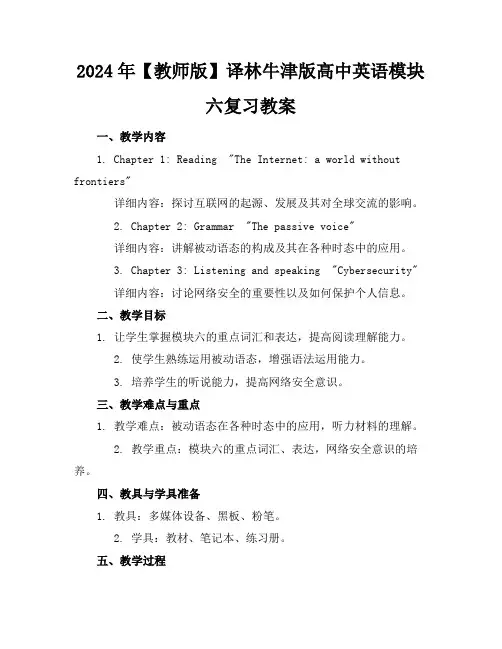
2024年【教师版】译林牛津版高中英语模块六复习教案一、教学内容1. Chapter 1: Reading "The Internet: a world without frontiers"详细内容:探讨互联网的起源、发展及其对全球交流的影响。
2. Chapter 2: Grammar "The passive voice"详细内容:讲解被动语态的构成及其在各种时态中的应用。
3. Chapter 3: Listening and speaking "Cybersecurity"详细内容:讨论网络安全的重要性以及如何保护个人信息。
二、教学目标1. 让学生掌握模块六的重点词汇和表达,提高阅读理解能力。
2. 使学生熟练运用被动语态,增强语法运用能力。
3. 培养学生的听说能力,提高网络安全意识。
三、教学难点与重点1. 教学难点:被动语态在各种时态中的应用,听力材料的理解。
2. 教学重点:模块六的重点词汇、表达,网络安全意识的培养。
四、教具与学具准备1. 教具:多媒体设备、黑板、粉笔。
2. 学具:教材、笔记本、练习册。
五、教学过程1. 导入:通过讨论互联网在日常生活中的应用,引出本节课的主题。
2. 新课内容呈现:a. 复习Chapter 1的阅读文章,讲解重点词汇和表达。
b. 复习Chapter 2的语法内容,通过例句和练习讲解被动语态。
c. 复习Chapter 3的听力材料,提高学生的听说能力。
3. 随堂练习:让学生运用所学知识,完成相关练习题。
4. 小组活动:分组讨论网络安全问题,提高学生的合作能力。
六、板书设计1. 高中英语模块六复习2. 内容:a. 重点词汇和表达。
b. 被动语态的构成及其在各种时态中的应用。
c. 网络安全的相关知识点。
七、作业设计1. 作业题目:a. 用被动语态改写下列句子:1. People use the Internet for various purposes.2. The teacher will correct our homework tomorrow.b. 阅读短文,回答问题(关于网络安全)。
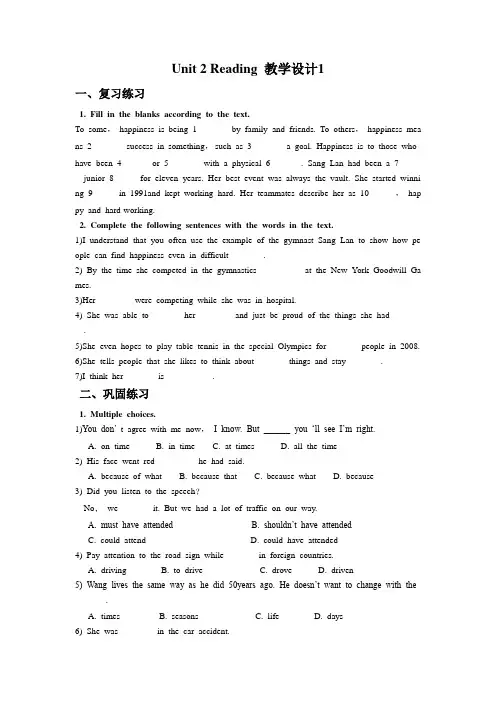
Unit 2 Reading 教学设计1一、复习练习1. Fill in the blanks according to the text.To some,happiness is being 1_______ by family and friends. To others,happiness mea ns 2_______ success in something,such as 3_______ a goal. Happiness is to those who have been 4______ or 5_______ with a physical 6_______. Sang Lan had been a 7_____ _ junior 8_____ for eleven years. Her best event was always the vault. She started winni ng 9_____ in 1991and kept working hard. Her teammates describe her as 10______,hap py and hard-working.2. Complete the following sentences with the words in the text.1)I understand that you often use the example of the gymnast Sang Lan to show how pe ople can find happiness even in difficult________.2) By the time she competed in the gymnastics _________ at the New York Goodwill Ga mes.3)Her _______ were competing while she was in hospital.4) She was able to ______ her _______ and just be proud of the things she had ______ __.5)She even hopes to play table tennis in the special Olympics for ______ people in 2008.6)She tells people that she likes to think about ______ things and stay _______.7)I think her ______ is __________.二、巩固练习1. Multiple choices.1)You don’t agree with me now,I know. But ______ you ‘ll see I’m right.A. on timeB. in timeC. at timesD. all the time2) His face went red ________ he had said.A. because of whatB. because thatC. because whatD. because3) Did you listen to the speech?No,we_______ it. But we had a lot of traffic on our way.A. must have attendedB. shouldn’t have attendedC. could attendD. could have attended4) Pay attention to the road sign while_______ in foreign countries.A. drivingB. to driveC. droveD. driven5) Wang lives the same way as he did 50years ago. He doesn’t want to change with the _______.A. timesB. seasonsC. lifeD. days6) She was _______ in the car accident.A. hurtB. woundedC. injuredD. damaged7) ______ are hard for Susan for she lost her job two weeks ago.A. LivesB. TimesC. TimeD. Life8) When you go abroad,you must______ yourself to new manners and customs.A. adaptB. adoptC. get usedD. make9) _________ she knows the house is safe,she won’t worry about it.A. Even thoughB. UnlessC. As long asD. While10) In order to change attitudes_______ employing women,they are bringing in new laws.A. aboutB. ofC. towardsD. on2. Complete the sentences.1. He fell down from the top of the tree and was badly i________.2. He has s______ against cancer for two years.3. She is d_______ to her job.4. The election was the main e_______ of 1999.5. He knew I was e________ and dynamic and would get things done.6. Sang Lan was a _________(体操运动员).7. She is ________(职位低下的)to me.8. She keeps herself _______(分开的)from other people.相关高考试题1. European football is played in 80 countries,______ it the most popular sport in theworld. (NMET1998)A. makingB. makesC. madeD. to make2. Helen had to shout _____ above the sound of the music. (2004广西)A. making herself hearB. to make herself hearC. making herself heardD. to make herself heard3. —Are you still thinking a bout yesterday’s game?—Oh,that’s ____________.(2003 北京春季)A. what makes me feel excitedB. whatever I feel excited aboutC. how I feel about itD. when I feel excited1. In some parts of London,missing a bus means______ for another hour.(2002上海春)A. waitingB. to waitC. waitD. to be waiting2. The owner of the cinema needed to make a lot of improvements and employ more people to keep it running,_________ meant spending tens of thousands of pounds. ( 2006江苏)A. whoB. thatC. asD. which。
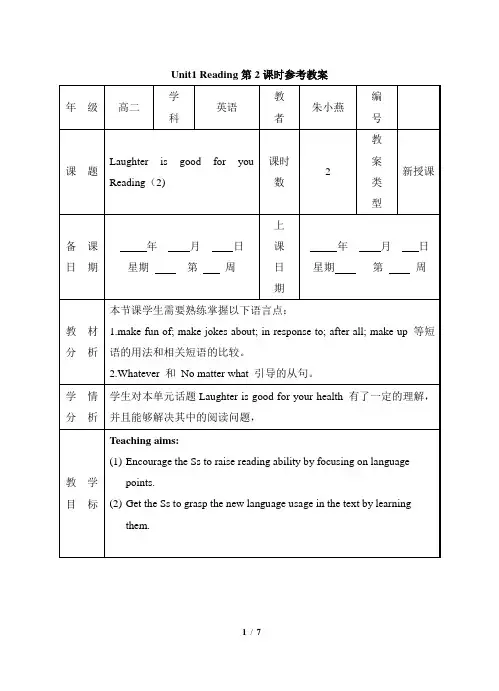
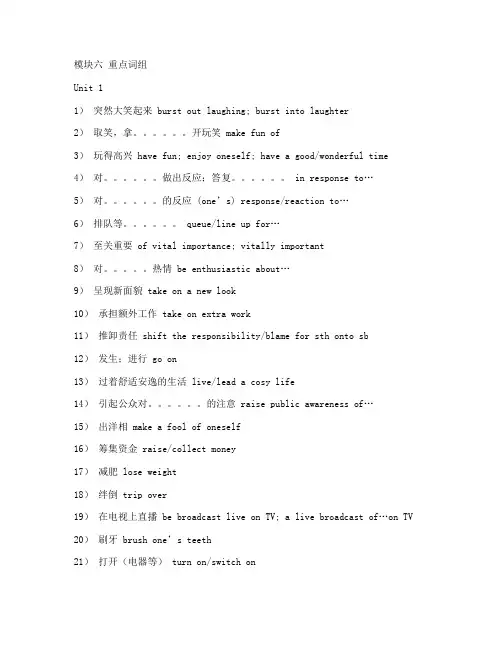
模块六重点词组Unit 11)突然大笑起来 burst out laughing; burst into laughter2)取笑,拿。
开玩笑 make fun of3)玩得高兴 have fun; enjoy oneself; have a good/wonderful time4)对。
做出反应;答复。
in response to…5)对。
的反应(one’s) response/reaction to…6)排队等。
queu e/line up for…7)至关重要 of vital importance; vitally important8)对。
热情be enthusiastic about…9)呈现新面貌 take on a new look10)承担额外工作 take on extra work11)推卸责任 shift the responsibility/blame for sth onto sb12)发生;进行 go on13)过着舒适安逸的生活 live/lead a cosy life14)引起公众对。
的注意raise public awareness of…15)出洋相 make a fool of oneself16)筹集资金 raise/collect money17)减肥 lose weight18)绊倒 trip over19)在电视上直播be broadcast live on TV; a live broadcast of…on TV 20)刷牙brush one’s teeth21)打开(电器等) turn on/switch on22)虚构,捏造;组成,构成,占;弥补,补偿 make up23)受。
喜爱be popular with…/popularity with…24)效仿follow in the footsteps of…25)对。
有影响have an effect/influence on…;26)战胜疼痛 fight pain27)查生词 look up a new word28)被分成。
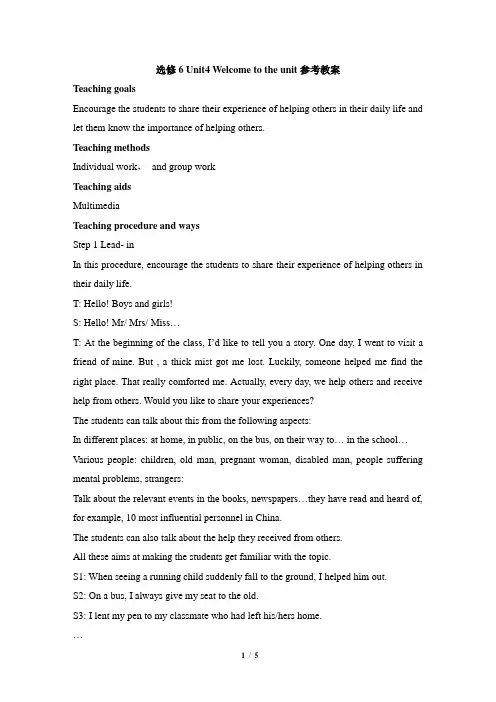
选修6 Unit4 Welcome to the unit参考教案Teaching goalsEncourage the students to share their experience of helping others in their daily life and let them know the importance of helping others.Teaching methodsIndividual work,and group workTeaching aidsMultimediaTeaching procedure and waysStep 1 Lead- inIn this procedure, encourage the students to share their experience of helping others in their daily life.T: Hello! Boys and girls!S: Hello! Mr/ Mrs/ Miss…T: At the beginning of the class, I’d like to tell you a story. One day, I went to visit a friend of mine. But , a thick mist got me lost. Luckily, someone helped me find the right place. That really comforted me. Actually, every day, we help others and receive help from others. Would you like to share your experiences?The students can talk about this from the following aspects:In different places: at home, in public, on the bus, on their way to… in the school…Various people: children, old man, pregnant woman, disabled man, people suffering mental problems, strangers:Talk about the relevant events in the books, newspapers…they have read and heard of, for example, 10 most influential personnel in China.The students can also talk about the help they received from others.All these aims at making the students get familiar with the topic.S1: When seeing a running child suddenly fall to the ground, I helped him out.S2: On a bus, I always give my seat to the old.S3: I lent my pen to my classmate who had left his/hers home.…T: Great! You’re ready to help others at any time and in any place. It is your kindness that makes our society much better. However, many things cannot be settled down only by yourself / on individual level. For example, the earthquake happened in Pakistan in Oct. 2005; the tsunami in Indian Ocean in Dec. 2004; terrorist attack in the United States on September 11, 2001.And what happened in these disasters? Work in groups and make a discussion.Before the students talk about these things, shows the following clues:The death tollBuilding damagesMental handicap to the Americans and even people around the world…Step 2 SpeakingAsk the students to talk about the pictures on page 49T: Now, let’s look at these pictures on page 49. Have you ever seen these situations? S: Yes!T: Where did you see them?S: Mainly on TV/ in newspapers/ in real life.T: Do you know what they talk about?S: They talk about peacekeeping, famine, flooding, agriculture (or irrigation), medical care, and poverty separately.T: Well done! Now, discuss these pictures in groups of four, and you can discuss in this way:What you can see in the picture;What the problems are;What caused these;How you feel about that;What organizations you know can help with the situations.Show the chart while the students are discussingSample answersAfter a few minutes, ask the students to report their discussion results.T: Who would like to talk about picture 1?S: Let me have a try. They’re two special soldiers. I usually s ee them on TV. When there are wars, or fighting in some countries, they will be sent there to keep peace. I think these special soldiers are brave and they contribute a lot to the peace and safety of the people who suffer from wars and conflicts.T: You’ve done a really great job! And can you tell us, by whom, the special soldiers are sent to keep the peace?S1: The nations that have special soldiers.S2: I don’t think so. I think it’s the UN.T: Yes. You’re right! They are sent through the UN. And we’ll le arn more about that inthe following classes. Picture 2, who wants to have a try?S: People in the picture are very thin, and painful because of a shortage of food. They suffer from famine. I’m sorry for them. Their most basic need cannot be fulfilled, to say nothing of education or entertainment. I think we shouldn’t waste food any more. By watching TV and reading newspapers, I know that our country often loans money to these countries and also give them aid. And the UN may have the relevant organization.T: Great! How about picture 3?S: From the picture we can see that this area was flooded. Typhoon or heavy rain has caused it. Houses there must have been destroyed. What is worse, many diseases will spread. In my opinion, people should be warned earlier, and doctors should be sent to deal with the possible diseases. And the WHO, the Red Cross, and the UN can help with the situation in the future.T: Excellent! How about picture 4?S: Water is pumped into the farmland. The crops grow well. So I think the field may suffer from drought or it is difficult to farm. Irrigation improvement here is necessary. Agriculture experts are also needed. I think the UN should have such an organization to help with this.T: Very good! What about picture 5?S: A doctor is looking at an X-ray under a lamp. He must help patients with bone problems in some poor areas. I think WHO and the Red Cross can do this.T: Well done! How about picture 6?S: People in small areas still live in poverty. Most of them cannot receive education as we do now, and can not play as we can. We have to cherish what we own today.T: That’ it! And what organization do you think can help with this?S: I think the UN can help them.T: OK! Most of you have mentioned the UN. From that we can say that the UN can help solve many problems, and plays a very important role in the international stage, right?S: Yes.Step 3 Summary and homeworkT: Today, we have talked about the 6 situations in this part, and learned that some countries around the world suffer from wars, natural disasters, famine, illness and poverty. And some of you have talked about your feelings. And you have known that these situations should be solved internationally, that is countries should help each other. You also mentioned some organizations that can deal with these situations, such as the UN,the Red Cross, the WHO. In the following periods, we’ll learn more about the UN. So, after class, you had better read books and surf the internet to collect some useful information about the UN. OK, class is over. Goodbye, boys and girls.。
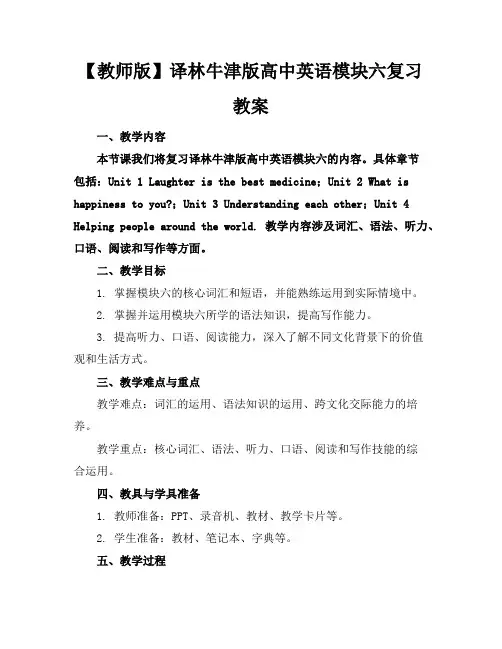
【教师版】译林牛津版高中英语模块六复习教案一、教学内容本节课我们将复习译林牛津版高中英语模块六的内容。
具体章节包括:Unit 1 Laughter is the best medicine;Unit 2 What is happiness to you?;Unit 3 Understanding each other;Unit 4 Helping people around the world. 教学内容涉及词汇、语法、听力、口语、阅读和写作等方面。
二、教学目标1. 掌握模块六的核心词汇和短语,并能熟练运用到实际情境中。
2. 掌握并运用模块六所学的语法知识,提高写作能力。
3. 提高听力、口语、阅读能力,深入了解不同文化背景下的价值观和生活方式。
三、教学难点与重点教学难点:词汇的运用、语法知识的运用、跨文化交际能力的培养。
教学重点:核心词汇、语法、听力、口语、阅读和写作技能的综合运用。
四、教具与学具准备1. 教师准备:PPT、录音机、教材、教学卡片等。
2. 学生准备:教材、笔记本、字典等。
五、教学过程1. 导入:通过播放一段关于幸福和理解的短视频,引导学生进入本节课的主题。
2. 语言点复习:a. 复习Unit 1和Unit 2的核心词汇和短语。
b. 复习Unit 3和Unit 4的语法知识。
3. 实践情景引入:设置一个关于帮助他人的情景,让学生运用所学知识进行交流。
4. 例题讲解:a. 针对词汇和短语进行例题讲解。
b. 针对语法知识进行例题讲解。
5. 随堂练习:让学生进行听力、口语、阅读和写作的练习,巩固所学知识。
六、板书设计1. 核心词汇和短语板书。
2. 语法知识板书。
3. 例题及答案板书。
七、作业设计1. 词汇练习:根据所给句子,用模块六的核心词汇填空。
答案:略。
2. 语法练习:改写下列句子,使用模块六所学的语法知识。
答案:略。
3. 阅读理解:阅读文章,并回答相关问题。
答案:略。
八、课后反思及拓展延伸1. 反思:针对本节课的教学内容、教学方法和学生的表现进行反思,找出需要改进的地方。
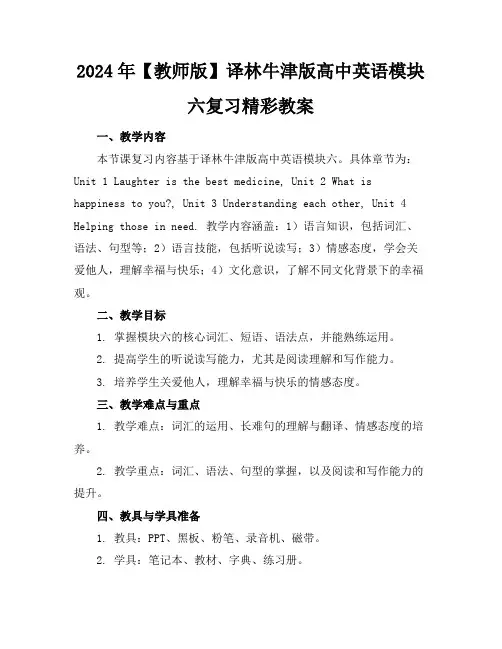
2024年【教师版】译林牛津版高中英语模块六复习精彩教案一、教学内容本节课复习内容基于译林牛津版高中英语模块六。
具体章节为:Unit 1 Laughter is the best medicine, Unit 2 What is happiness to you?, Unit 3 Understanding each other, Unit 4 Helping those in need. 教学内容涵盖:1)语言知识,包括词汇、语法、句型等;2)语言技能,包括听说读写;3)情感态度,学会关爱他人,理解幸福与快乐;4)文化意识,了解不同文化背景下的幸福观。
二、教学目标1. 掌握模块六的核心词汇、短语、语法点,并能熟练运用。
2. 提高学生的听说读写能力,尤其是阅读理解和写作能力。
3. 培养学生关爱他人,理解幸福与快乐的情感态度。
三、教学难点与重点1. 教学难点:词汇的运用、长难句的理解与翻译、情感态度的培养。
2. 教学重点:词汇、语法、句型的掌握,以及阅读和写作能力的提升。
四、教具与学具准备1. 教具:PPT、黑板、粉笔、录音机、磁带。
2. 学具:笔记本、教材、字典、练习册。
五、教学过程1. 导入:通过播放一段关于幸福与快乐的英语视频,引发学生对主题的思考。
2. 语言知识复习:a. 教师带领学生复习模块六的词汇、短语、语法点。
b. 学生进行小组讨论,互相提问,巩固知识点。
3. 语言技能训练:a. 听力训练:播放录音,学生完成相关练习。
b. 口语训练:学生进行小组讨论,谈论自己对幸福的理解。
c. 阅读训练:阅读文章,完成相关习题。
d. 写作训练:根据所学内容,仿写一篇关于幸福的作文。
4. 情感态度培养:通过讨论、分享,引导学生关爱他人,理解幸福与快乐。
5. 文化意识拓展:介绍不同文化背景下的幸福观,提高学生的文化意识。
六、板书设计1. 核心词汇、短语、语法点。
2. 阅读和写作技巧。
3. 情感态度培养:关爱他人,理解幸福与快乐。
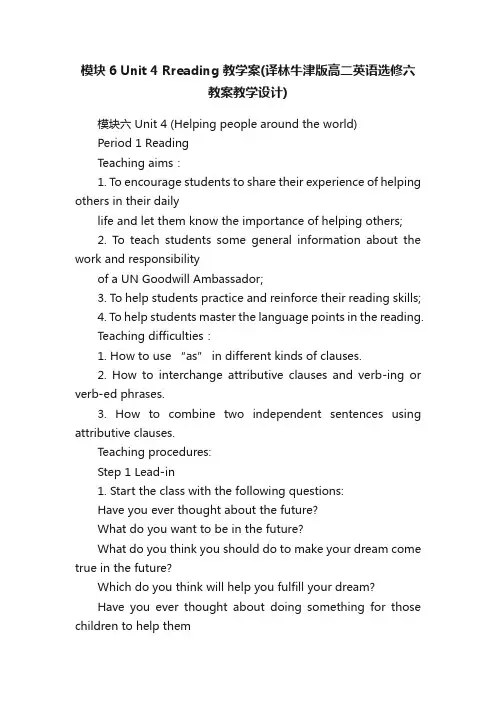
模块6 Unit 4 Rreading 教学案(译林牛津版高二英语选修六教案教学设计)模块六 Unit 4 (Helping people around the world)Period 1 ReadingTeaching aims:1. To encourage students to share their experience of helping others in their dailylife and let them know the importance of helping others;2. To teach students some general information about the work and responsibilityof a UN Goodwill Ambassador;3. To help students practice and reinforce their reading skills;4. To help students master the language points in the reading.Teaching difficulties:1. How to use “as” in different kinds of clauses.2. How to interchange attributive clauses and verb-ing or verb-ed phrases.3. How to combine two independent sentences using attributive clauses.Teaching procedures:Step 1 Lead-in1. Start the class with the following questions:Have you ever thought about the future?What do you want to be in the future?What do you think you should do to make your dream come true in the future?Which do you think will help you fulfill your dream?Have you ever thought about doing something for those children to help themrealize their dreams? If you have, what would you do?2. Have students discuss and report their answers to the class. Help studentsunderstand that not everyone in the world has the same opportunities. It wouldbe very hard for some people in poor areas to realize even a simple dream likehaving a warm bed to sleep in at night. Something should be done for those whoare suffering a lot.3. Tell students that they are going to read a passage abouta helpful woman whohas devoted lots of her energy and time to making the life of poor people better.Ask students what they can find by reading the title, and ask them to predictwhat may be covered in the passage that they are going to read. Say:Today, we are going to read a passage entitled “The UN-bringing everyone closertogether”. What do you think of when you see the title? What do you think willbe mentioned in the passage?Step 2 Reading-comprehension1. Ask students to go through the passage as quickly as possible and try to find theanswers to the three questions in Part A. Remind students only to focus on andanswer these questions.2. Ask students to read the passage again and complete PartsC1 and C2 individually.After students finish the exercises, check the answers with the class.3. design a table to check the students’ reading comprehension about the UN.The United NationsWhen it was set up After the Second World War in October 1945Countries in the UN Originally 51 countriesRecently 191 countriesProblems it deals with Helps end some of the world’s most horrible conflicts, assists the victims of wars and disasters; protect human rights; improves international laws; helps with other problems such as lack of education, lack of food, poverty, disasters and diseaseIts four main purposes To keep international peaceTo develop friendly relationships among nationsTo cooperate in solving international problems and in promoting respect for human rightsTo be a centre for organizing the actions or work of different nationsGoals it promises to achieve by 2015 Eight goals, one of which is to ensure that fresh drinking water is available to everyone and another is that all children complete primary education4. Talk to students about Tang Ning. Ask students what they know about thisUN Goodwill Ambassador and businesswoman from the passage. You may askthe following questions:What occupation does she take up in the UN?How much money does she earn by doing this Job?What Project or projects has she been involved in?How does she help those people that need help?How does she feel about taking this occupation?What do you think of Tang Ning?Step 3 Language points1. refer toWhat I have to say refers to all of you.When I said that some people were stupid I was not referring to you.Please refer to the last page of the book for answers.It is a collection of documents with reference to the First World War.2. be made up ofA team made up of three doctors and ten nurses was sent to the disaster area.The oldest kind of computer was a huge machine made up of thousands of parts,covering nearly 100 square meters.3. operateAll the Disney parks are operated by the same company.This machine operates day and night.The doctors decide to operate on her immediately.Operation n.I can use a word processor but I don’t understand its operation.He is the officer in charge of operation.4. honoredHe was honored with a title of “ Model Worker”.They removed their hats to honor the flag.It’s a great honor to be invited.May I have the honor of this dance?While in London, we paid a visit to the hospital founded in honor of the nurseFlorence Nightingale.5. touchVisitors are not allowed to touch the exhibits.I was really touched beyond words.We’ll keep in touch with each other wherever we go.I hope we don’t lose touch again.6. apart fromThe house stands apart from the village.I can’t get these two things apart.He tore the cooked chicken apart and began to eat it.7. lackThey are so rich that they lack for nothing.He was acquitted for lack of evidence.There was a severe shortage of petroleum during the war.8. ensureThe book ensured his success.Please ensure that all the lights are turned off at night.These pills should ensure you a good night’s sleep.Customs are asked to ensure that they have been given the right change beforeleaving the shop.9. rather thanI’d prefer to go in summer rather than in winter.It ought to be me rather than you that sign the letter.I decided to write rather than (to ) telephone.I would stay at home rather than go shopping.He would rather beg in the streets than get money in such a dishonest way.10. on behalf ofOn behalf of my colleagues and myself I thank you.Ken is not present, so I shall accept the prize on his behalf.The legal guardian must act on behalf of the child.On behalf of all the staff, I would like to wish you a happy retirement.Step4 Practice & Reading strategy1. Ask students to complete Part D and Part E individually. Part D aims to checkwhether students can understand the meanings of words from the context of thepassage and to show them how to explain the meanings in English. Part E aims tomake students more familiar with the reading passage and some useful words in it.2. Ask students if they have ever read a speech before and encourage them to find outwhat unique language is used in a speech. Remind then that when reading a speech,it is important to pay attentio n to the speaker’s attitude. The positive and negativeadjectives can help then identify the positive negative opinion or attitude of thespeaker.3. Ask students to read the Reading Strategy and find more sentences that express thespeaker’s attitude in the reading passage.Step5 Homework1. Review the text carefully after class.2. Finish off Part A1, A2 in Workbook.3. Finish off the exercise paper for this part.Exercises for students:一、非谓语动词复习练习1. ______ nuclear radiation, even for a short time, may produce variants (变异) of genesin human bodies.A. SufferedB. SufferingC. Being sufferedD. Having suffered2. ______ to be practical, the new teaching method is being accepted by more and moreeducational workers.A. Having provedB. ProvingC. ProvedD. Having been proved3. The car burns much fuel, but ______ all things into consideration, it is still a good car.A. takenB. having takenC. takingD. to take4. -The price is fine with me. How would you like it ______? -In cash, please.A. to payB. payC. paidD. being paid5. When he came back, he found the bag he had ______ over the seat was gone.A. left to handB. left hangingC. left hungD. to leave hanging6. -Why do you look so disappointed, John?-The outdoor concert ______ for tomorrow will be put off.A. to planB. to be plannedC. planningD. planned7. The news reporter hurried to the airport, only ______ the film star had left.A. to tellB. tellingC. to be toldD. told8. ______ a job as a professor in a well-known university, adoctor's degree is needed.A. Having goB. If you wantC. So as to getD. In order to get9. These examples, once ___ to his article, will make it sound more reasonable andacceptable. A. add B. to add C. adding D. added10. -Where can I get this gift ______? -Over at Window No. 6 and wait ______.A. to be wrapped; to be calledB. wrapping; to callC. wrapped; to callD. wrapped; to be called11. “I hope the operation,” said the father, “______ now will give my son a new life. ”A. being performedB. to be performedC. performingD. performed12. There are ten waiting rooms at the newly-built station, in all 20,000 people.A. seatingB. seatedC. sittingD. to seat13. -How do you deal with the agreement between the company and the customers?-The key _ the problem is to meet the demand _ by the customers.A. to solving; makingB. to solving; madeC. to solve; makingD. to solve; made14. More natural resources should be made use of ______ the ______ need of energy.A. meeting; increasingB. to meet; increasedC. meeting; increasedD. to meet; increasing15. The man we followed suddenly stopped and looked as if ______ whether he wasgoing in the right direction.A. seeingB. having seenC. to have seenD. to see16. Though ______ money,his parents managed to send him to university.A. lackedB. lacking ofC. lackingD. lacked in17. The local health organization is reported ___ twenty-five years ago.A. to be set upB. to set upC. to have been set upD. to have set up18. I appreciated ______the opportunity to study abroad two years ago.A. having been givenB. having beenC. to have been givenD. to have given19. There is no point ___further.A. argueB. to argueC. arguingD. being arguing20. All flights___ because of the snowstorm, we decided to take the train.A. were canceledB. had been canceledC. having canceledD. having been canceled21. He always does nothing but___.A. complainingB. complainsC. complainD. to complain22. John painted her sitting in a chair with her hands ___.A. foldingB. to have foldedC. to foldD. foldedRecording after teaching:向你推荐的相关文章相关文章列表微信扫码分享热搜文章•1•2•3 •4 •5 •6 •7 •8 •9 •10 ~。
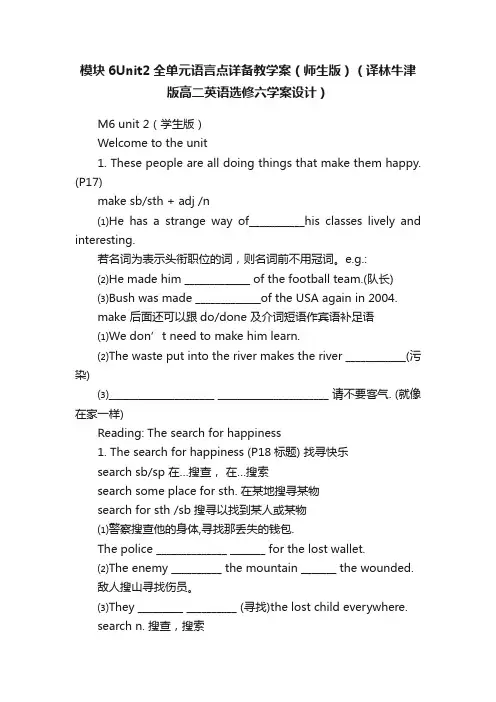
模块6Unit2全单元语言点详备教学案(师生版)(译林牛津版高二英语选修六学案设计)M6 unit 2(学生版)Welcome to the unit1. These people are all doing things that make them happy. (P17)make sb/sth + adj /n⑴He has a strange way of___________his classes lively and interesting.若名词为表示头衔职位的词,则名词前不用冠词。
e.g.:⑵He made him _____________ of the football team.(队长)⑶Bush was made _____________of the USA again in 2004.make 后面还可以跟do/done 及介词短语作宾语补足语⑴We don’t need to make him learn.⑵The w aste put into the river makes the river ____________(污染)⑶_____________________ ______________________ 请不要客气. (就像在家一样)Reading: The search for happiness1. The search for happiness (P18标题) 找寻快乐search sb/sp 在…搜查,在…搜索search some place for sth. 在某地搜寻某物search for sth /sb 搜寻以找到某人或某物⑴警察搜查他的身体,寻找那丢失的钱包.The police ______________ _______ for the lost wallet.⑵The enemy __________ the mountain _______ the wounded.敌人搜山寻找伤员。
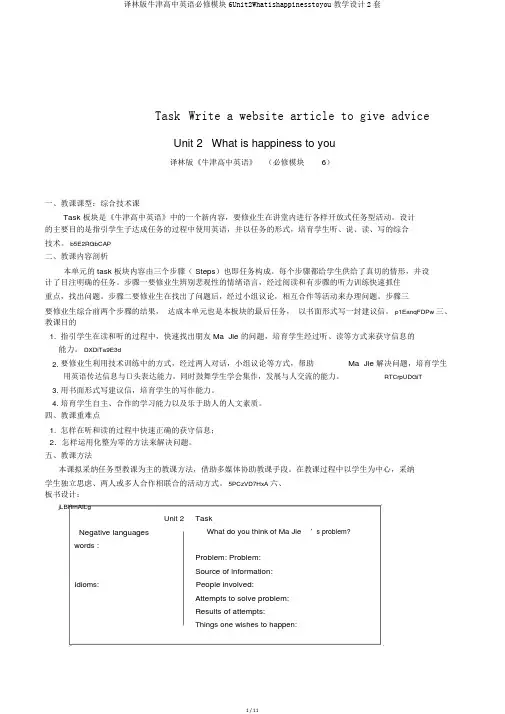
Task Write a website article to give adviceUnit 2 What is happiness to you译林版《牛津高中英语》(必修模块6)一、教课课型:综合技术课Task 板块是《牛津高中英语》中的一个新内容,要修业生在讲堂内进行各样开放式任务型活动。
设计的主要目的是指引学生子达成任务的过程中使用英语,并以任务的形式,培育学生听、说、读、写的综合技术。
b5E2RGbCAP二、教课内容剖析本单元的 task 板块内容由三个步骤( Steps)也即任务构成。
每个步骤都给学生供给了真切的情形,并设计了目注明确的任务。
步骤一要修业生辨别悲观性的情绪语言,经过阅读和有步骤的听力训练快速抓住重点,找出问题。
步骤二要修业生在找出了问题后,经过小组议论,相互合作等活动来办理问题。
步骤三要修业生综合前两个步骤的结果,达成本单元也是本板块的最后任务,以书面形式写一封建议信。
p1EanqFDPw 三、教课目的1.指引学生在读和听的过程中,快速找出朋友Ma Jie 的问题,培育学生经过听、读等方式来获守信息的能力。
DXDiTa9E3d2. 要修业生利用技术训练中的方式,经过两人对话,小组议论等方式,帮助Ma Jie 解决问题,培育学生用英语传达信息与口头表达能力。
同时鼓舞学生学会集作,发展与人交流的能力。
RTCrpUDGiT3. 用书面形式写建议信,培育学生的写作能力。
4. 培育学生自主、合作的学习能力以及乐于助人的人文素质。
四、教课重难点1.怎样在听和读的过程中快速正确的获守信息;2.怎样运用化整为零的方法来解决问题。
五、教课方法本课拟采纳任务型教课为主的教课方法,借助多媒体协助教课手段。
在教课过程中以学生为中心,采纳学生独立思虑、两人或多人合作相联合的活动方式。
5PCzVD7HxA 六、板书设计:jLBHrnAILgNegative languages Unit 2 TaskWhat do you think of Ma Jie ’s problem?words :Idioms: Problem: Problem:Source of information: People involved:Attempts to solve problem: Results of attempts:Things one wishes to happen:七、教课过程(90 分钟 )依据教参要乞降教课本质,本板块不行能在 45 分钟内很完好的进行听闻读写的多重担务,因此分为两课时。
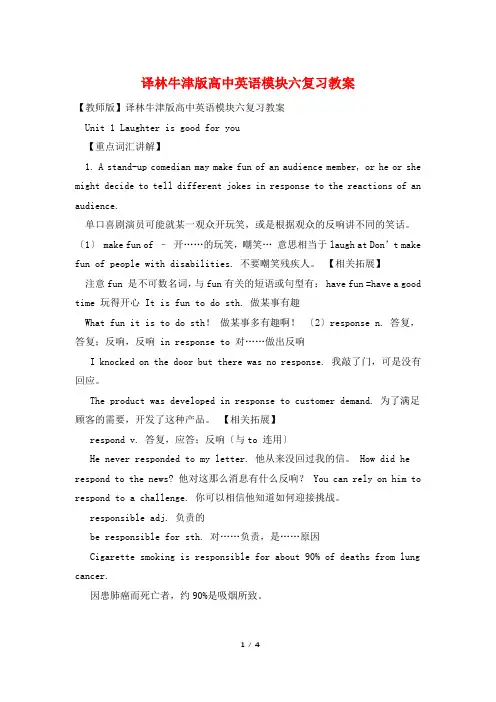
译林牛津版高中英语模块六复习教案【教师版】译林牛津版高中英语模块六复习教案Unit 1 Laughter is good for you【重点词汇讲解】1. A stand-up comedian may make fun of an audience member, or he or she might decide to tell different jokes in response to the reactions of an audience.单口喜剧演员可能就某一观众开玩笑,或是根据观众的反响讲不同的笑话。
〔1〕 make fun of –开……的玩笑,嘲笑…意思相当于laugh at Don’t make fun of people with disabilities. 不要嘲笑残疾人。
【相关拓展】注意fun 是不可数名词,与fun有关的短语或句型有: have fun =have a good time 玩得开心 It is fun to do sth. 做某事有趣What fun it is to do sth!做某事多有趣啊!〔2〕response n. 答复,答复;反响,反响 in response to 对……做出反响I knocked on the door but there was no response. 我敲了门,可是没有回应。
The product was developed in response to customer demand. 为了满足顾客的需要,开发了这种产品。
【相关拓展】respond v. 答复,应答;反响〔与to 连用〕He never responded to my letter. 他从来没回过我的信。
How did he respond to the news? 他对这那么消息有什么反响? You can rely on him to respond to a challenge. 你可以相信他知道如何迎接挑战。
Unit 1 Laughter is good for you【重点词汇讲解】1. A stand-up comedian may make fun of an audience member, or he or she might decide totell different jokes in response to the reactions of an audience.单口喜剧演员可能就某一观众开玩笑,或是根据观众的反应讲不同的笑话。
(1)make fun of –开……的玩笑,嘲笑…意思相当于laugh atDon’t make fun of people with disabilities. 不要嘲笑残疾人。
【相关拓展】注意fun 是不可数名词,与fun有关的短语或句型有:have fun =have a good time 玩得开心It is fun to do sth. 做某事有趣What fun it is to do sth!做某事多有趣啊!(2)response n. 回答,答复;反应,反响in response to 对……做出反应I knocked on the door but there was no response. 我敲了门,可是没有回应。
The product was developed in response to customer demand.为了满足顾客的需要,开发了这种产品。
【相关拓展】respond v. 回答,应答;反应(与to 连用)He never responded to my letter. 他从来没回过我的信。
How did he respond to the news? 他对这则消息有什么反应?You can rely on him to respond to a challenge. 你可以相信他知道如何迎接挑战。
responsible adj. 负责的be responsible for sth. 对……负责,是……原因Cigarette smoking is responsible for about 90% of deaths from lung cancer.因患肺癌而死亡者,约90%是吸烟所致。
2.People around the world enjoy watching him when he hosts the Academy Awards.全世界的人们都喜欢看他主持奥斯卡颁奖庆典。
award(1)n. 奖;奖品;奖金;奖状He won an award for his good performance. 他因表演得好而获奖。
People like to attend the award ceremony hosted by him.人们喜欢参加他主持的颁奖仪式。
(2)v. 授予;奖励He was awarded the first prize. 他获得了一等奖。
The gold medal was awarded to Mr. Brown for his excellent performance.布朗先生因其优异的表现而获得了金牌。
【辨析】award / prize/ reward(1)award 意为“奖,奖品”,指对于优异成绩或卓越贡献经过评定后正式授予的奖励,可以是精神的,也可以是物质的,常用于奖项名称。
(2)prize意为“奖赏,奖品”,多指确认某人在竞赛中获得的优异成绩并给予特殊的奖励。
(3)reward意为“报答,酬劳”,并不指某种荣誉,而指应得的报酬;也可以做动词表示“给人以报酬、奖赏”。
He was nominated for the best actor award. 他获得最佳男演员奖提名。
He won first prize in the English Speech Competition. 他在英语演讲比赛中获一等奖。
He was rewarded for finding the lost dog. 他因找到那只丢失的狗而获得报酬。
Winning the match was just reward for the effort the team had made.赢得比赛的胜利是全队付出努力应得的回报。
3.Each time, he performs his stand-up routine in front of millions of people when the show isbroadcast live on TV. 每次,当节目在电视上现场直播时他都是在上百万人面前表演他的单口喜剧节目。
live(1)adv. 现场地;直播地With all the news broadcast live, the pressure on the announcers is becoming heavier.随着新闻的直播,播音员的压力变得更大了。
(2)adj. 现场的,直播的;有生命的,活的We are watching the live coverage of the Olympics. 我们正在观看奥运会实况报道。
She was frightened at the sight of a live snake. 看到一条活蛇她吓坏了。
注意:live 做“活着的”讲时,作定语要前置,一般不指人。
【辨析】live/ alive/ living/ livelylive adj. “活着的”(与dead想对应),只能做定语(指动物),另外还有“现场直播的”意思(反义词recorded “录制的,转播的”)alive adj. “活着的,健在的”,做表语;作定语需后置(一般用于人,有时也用于动物)living adj. “活着的;有生命的”。
既可以作定语,也可以作表语。
“生物”只能译作living thingslively adj. 生动的,活泼的They are carrying out an experiment with a live monkey.他们正在用一只活的猴子做实验。
It was a live broadcast, not a recording. 这是现场直播而非转播。
Who is the greatest man alive? 谁是当今活着的最伟大的人?4.Crystal’s popularity with all age groups and his ability to amuse people all over the worldprove that stand-up can be enjoyed by everyone. 克里斯托在各个年龄段人群之间的受欢迎程度和他愉悦全世界人们的能力证明人人都可能喜欢单口喜剧。
amuse vt. 使愉快,使高兴He came up with a good idea to amuse the kids. 他想出了一个好主意来逗孩子开心。
【相关拓展】(1)amused adj. 觉得好笑的(2)amusing adj. 逗人笑的,有趣的(3)amusement n. 可笑,愉悦,娱乐to one’s amusement =to the amusement of sb 令某人高兴的,好笑的是We are amused at his amusing stories. 我们都被他有趣的故事逗乐了。
To my amusement, he couldn’t get the door open. 使我感到好笑的是,他竟然打不开门。
5.Writing is tough work, but I hope it will all be worthwhile, …写作是辛苦的工作,但我希望这是值得的,……worthwhile adj. 值得的;值得花时间、钱或精力的It is worthwhile taking the trouble to explain a job fully to a new employee.给新雇员详细解释一下工作要求,费点事是值得的。
It is worthwhile discussing the question. 这个问题值得讨论。
【辨析】worthwhile/ worth/ worthy 三个都是形容词,都是“值得的”意思,但是所使用的句型不同(1)worthwhile 用于下列句型:It is worthwhile doing sth./ to do sth. 干某事是值得的但不能说:sth. is worthwhile doing/ to do(2)worth 用于下列句型:sth. is worth sth/ doing此句型中只能用doing,不能使用被动。
在表达“很值得”时前面加well 修饰The museum is certainly worth a visit. =The museum is certainly worth visiting.这个博物馆的确值得参观。
This idea is well worth considering. 这个想法很值得考虑。
(3)worthy 用于下列句型:sth. be worthy of sth/ being donesth. be worthy to be doneThe film is worthy of being seen.= The film is worthy to be seen.这部电影值得看。
6.Somehow, the new things he thinks of are always funnier than what he was supposed tosay! 不知何故,他想出的新点子比原来他应该讲的更好笑。
somehow adv. 由于某种未知的原因,不知为什么Somehow,I don’t feel I can trust him. 不知为什么,我觉得不能信任他。
He always worked hard, but somehow, he never did the job well.他总是很努力,但不知怎么的,他就是做不好。
7.In an interview, he told us that he is always happy to take on new foreign students.在一次采访中,他告诉我们说他随时都乐于接收外国学生。
take on①接收,接受②雇佣③呈现④承担,决定做I can’t take on any extra work. 我不能承担任何额外的工作。